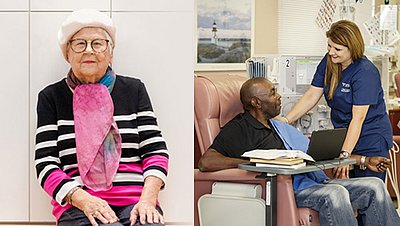Our patient stories and company features.
The Next Level of Renal Care
By Rice Powell, Former Chief Executive Officer and Chairman of the Management Board of Fresenius Medical Care
Fresenius Medical Care is the leading provider of kidney care products and services in the world. We feel a strong responsibility to act sustainably: Our projections show that by 2030, more than 6 million patients will need regular dialysis – a 460 percent increase from 2000.3
More than 25 percent of our U.S. patients are currently enrolled in a value-based care plan. That means that we manage their total cost of care, which gives us a natural incentive to look for savings. But there's a smart catch: Value-based care programs also measure and reward clinical performance. Better patient outcomes translate into financial improvements. These "wins" then create a funding mechanism for further enhancements, resulting in a virtuous cycle of increasing quality at decreasing costs.
For example, once someone is diagnosed with end-stage kidney disease, they need to decide and learn all these new things: What therapy to use, where to undergo treatment, in-center or home, what medication to take, what diet to keep. Helping them coordinate their care during this challenging time can have a tremendous impact on their quality of life, as results from one of our value-based care programs show:
Our care coordination activities prove it's possible to reduce inefficiencies in today's health care systems while keeping up with the latest advancements in science, technology, and medicine.
At Fresenius Medical Care, we serve more than half of the world's dialysis patients with our products and run over 4,000 dialysis clinics in 50 countries. Our innovation culture is responsible for some of the most significant advancements in the field. We possess the data, the engineering capabilities, the scale, and the network to lift renal care to the next level.
Let's take a look at the beginning of a patient’s journey for example: We have already started to expand value-based care programs to include earlier stages of chronic kidney disease when it's still possible to slow down its progression. If patients need to start dialysis, we are making that transition easier and safer for them. Our education efforts introduce ever more patients to the benefits of home dialysis. And we want to go even further than that: The next level of renal care will expand value-based care programs to include kidney transplants. From there, it's personalized dialysis, holistic home care, and other innovations.
We will continue along this path in the U.S. and apply our findings globally. After all, most health care systems in the world share the same challenges. They will all benefit from the solutions that we have to offer.
Related content
1 Cf. 20200921_CMD 2020 Rice Powell_TP final, p.11. Der besseren Lesbarkeit wegen wurden 578 M Diabeteskranke auf „over half a billion“ gerundet. Die UN rechnet für 2030 mit einer Weltbevölkerung von 8.5 Mrd. Menschen. Hat jeder 4. Bluthochdruck, sind das 2,125 Mrd. Menschen, d.h. „over 2 billion“ https://www.un.org/sustainabledevelopment/blog/2015/07/un-projects-world-population-to-reach-8-5-billion-by-2030-driven-by-growth-in-developing-countries/
2 Cf. 20200921_CMD 2020 Rice Powell_TP final, p.6
3 Cf. 20200921_CMD 2020 Rice Powell_TP final, p.11
4 Annual Medical Report: FMC_AMR_2020_Clinical Performance Supports Organized Value-Based Care, p. 91


